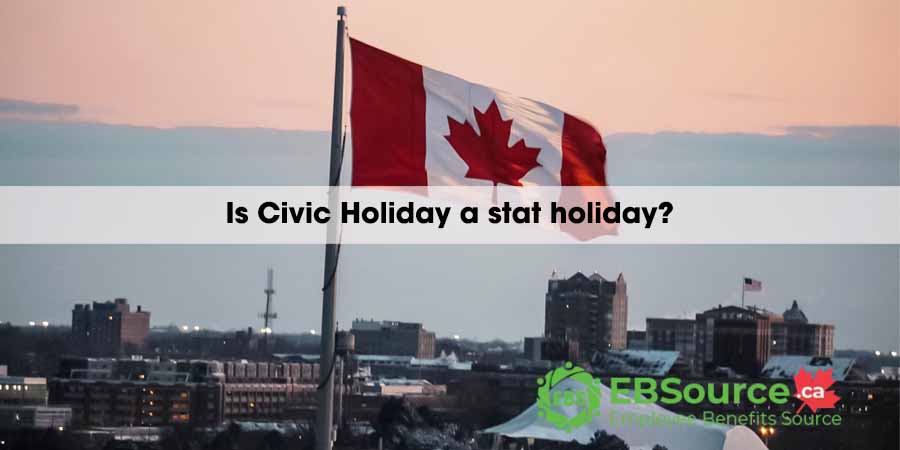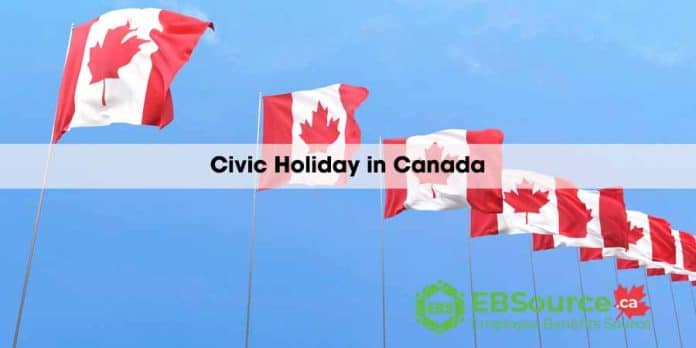Civic Holiday is one of the most confusing events in Canada. In some regions, such as NWT and NU, it is a holiday with a guaranteed day off. Meanwhile, in others, it is more of a local tradition, with the name varying across the country.
Read this article to discover whether it is a public holiday in Canada, understand your rights, pay entitlements, and the services available to you.
What is the Civic Holiday in Canada?
Civic Holiday is a public holiday observed across Canada, falling on the first Monday in August. Unlike nationally mandated holidays such as Canada Day or Christmas, its status varies because it falls under provincial laws rather than federal ones. Therefore, each province sets its own rules for pay and employer obligations on this day.
For instance, in Ottawa, it is known as Colonel By Day, which commemorates the builder of the Rideau Canal. In Manitoba, it is celebrated as Terry Fox Day, honouring the Marathon of Hope runner.
When is the Civic Holiday in Canada?
Here is the Civic Holiday calendar from 2025 to 2030:
| Year | Date |
| 2025 | Monday, August 4 |
| 2026 | Monday, August 3 |
| 2027 | Monday, August 2 |
| 2028 | Monday, August 7 |
| 2029 | Monday, August 6 |
| 2030 | Monday, August 5 |
The consistent first Monday timing in August provides eligible Canadians with a long weekend in the summer. However, it is celebrated under different names in each province, highlighting local history, culture, and community achievements.

What are the Regional Names of Civic Holiday?
Each province, territory, and even individual municipalities in Canada assign different names on the same date, carrying dozens of official designations.
Here are its common names in each region:
| Province/Territory | Local Name |
| British Columbia | BC Day (provincial), Vancouver Day (occasional local usage) (statutory holiday) |
| Saskatchewan | Saskatchewan Day (statutory provincial holiday) |
| New Brunswick | New Brunswick Day (statutory holiday) |
| Northwest Territories | The first Monday in August (statutory) |
| Nunavut | The First Monday in August (statutory) |
| Alberta | Heritage Day (provincial recognition, not statutory) |
| Manitoba | Terry Fox Day (honouring the Canadian hero) (not statutory) |
| Ontario | Civic Holiday; Simcoe Day (Toronto); Colonel By Day (Ottawa); John Galt Day (Guelph); Peter Robinson Day (Peterborough); various others by municipality (not statutory) |
| Prince Edward Island | Natal Day (some communities) (not statutory) |
| Quebec | Not observed (Saint-Jean-Baptiste Day serves as a summer holiday) |
| Nova Scotia | Natal Day (Halifax and some regions) (not statutory) |
| Newfoundland and Labrador | Not specifically observed |
| Yukon | No first‑Monday‑in‑August holiday; Discovery Day is celebrated instead |
Source: Civic/Provincial Day 2025 in Canada – timeanddate.com
Understanding your region’s specific name can help with local searches and understanding official holiday schedule notices.
Is Civic Holiday a Statutory Holiday in Canada?

Federal employees outside Quebec and Yukon receive the holiday regardless of their province. However, provincial employees’ entitlements depend entirely on their place of work.
The following breakdown covers every Canadian jurisdiction’s official stance:
Federal Employee Entitlements
The first Monday in August is not a federal holiday under the Canada Labour Code. So, federally regulated employees do not automatically get this day off. However, some federal public service agreements recognize this holiday, so benefits can differ depending on the agreement and location.
Provincial/Territorial Employee Entitlements
Only British Columbia, Saskatchewan, New Brunswick, Northwest Territories, and Nunavut mandate Civic Holiday as a statutory holiday. In these jurisdictions, eligible employees have legal rights to either paid time off or premium pay if they work.
However, Alberta, Manitoba, Ontario, Nova Scotia, Prince Edward Island leave decisions to individual employers, who may offer it as an employee benefit or skip it entirely.
Quebec and Yukon do not observe Civic Holiday at all. Yukon instead celebrates Discovery Day on the third Monday in August, while many places in Newfoundland and Labrador have different dates for their civic holidays.
What Are Employer Responsibilities for the Civic Holiday?
Employer responsibilities for the August long weekend vary based on provincial jurisdiction and your employment status.
Here are 2 main cases that employers need to consider:
Statutory Province Rules
In British Columbia, Saskatchewan, New Brunswick, and Nunavut, employers face mandatory legal obligations under provincial employment standards legislation.
British Columbia
On BC Day, if an employee does not work, they receive their average daily pay. If they work, they earn 1.5 times their average daily pay for the hours worked (2 times for hours over 12), plus their average daily pay. If BC Day falls on their day off, they receive their average daily pay for that day.
To calculate holiday pay in British Columbia, divide your total wages by the number of days you worked in the 30 days before the holiday. Total wages include regular pay, salary, commission, holiday pay, vacation pay, and sick pay, but exclude overtime.
Formula: Average day’s pay = total eligible wages in the 30 days before the holiday / days worked
Source: Calculate statutory holiday pay – Government of British Columbia
Saskatchewan
On Saskatchewan Day, employees earn 1.5 times their regular pay plus an extra 5% for public holiday pay. Overtime starts after 32 hours in a holiday week, not including hours worked on the holiday.
Note that new employees qualify for public holiday pay immediately, receiving 5% of their earnings before the holiday, even if they have not worked for 4 weeks.
Public holiday pay is calculated as 5% of total wages for the last 28 days (4 weeks) before Saskatchewan Day, including vacation pay but excluding overtime.
Formula: Public holiday pay = 5% of total wages for the previous 28 days
Source: Paying Employees for Public Holidays – Government of Saskatchewan
New Brunswick
Employers have two options for paying employees on New Brunswick Day:
- Regular Day’s Pay: Pay the employee their usual day’s wage. If the pay varies, calculate the average from the past 30 days (excluding overtime).
- Four-percent Method: Employers can choose the 4% method for public holiday benefits. If an eligible employee works on a public holiday, they still get paid 1.5 times their regular rate for those hours.
If an employee works on a public holiday, they get their regular day’s pay plus 1.5 times their usual wage for each hour worked that day.
Source: Paid public holidays, vacation time and pay – Government of New Brunswick
Nunavut
If an employee does not work on a Civic Holiday, they get paid for a regular day (subject to eligibility). For employees with varying wages, the regular day’s pay is calculated based on their average daily earnings.
If an employee works on a Civic Holiday, the employer can choose one of two options:
- Pay regular wages and give an extra day off.
- Pay public holiday pay plus 1.5 times their rate for hours worked.
If the Civic Holiday falls on an employee’s day off, they receive pay for that day. They can also choose to take the day off later or add it to their vacation time, provided both the employer and the employee agree.
Source: General Holidays – Government of Nunavut
Northwest Territories
Eligible employees in the territory who do not work on a Civic Holiday receive an average day’s pay based on their recent earnings. If they work on the holiday, they can choose between:
- Receive time‑and‑a‑half the hourly rate for all hours worked.
- Get a combination of cash and a day off later, agreed upon by both the employee and employer.
If the holiday falls on a non-working day and you do not work, you still get an average day’s pay. Employers can request to move the holiday to another day, like Monday, if it falls on a Sunday. In that case, you get the Monday off instead.
Source: Employment Standards Fact Sheet – Government of Northwest Territories
Optional Province Rules
In Ontario, Alberta, Manitoba, Nova Scotia, Prince Edward Island, Newfoundland and Labrador, the Civic Holiday is not a legal requirement. Employers in these provinces choose to recognize it through company policies or collective agreements.
If they designate Civic Holiday as a paid holiday, they have to:
- provides qualified employees with a paid day off OR,
- paying premium wages (typically 1.5 times the regular rate) and providing an additional day off if required to work.
If companies operate in multiple provinces, they must ensure that employees in statutory provinces receive their statutory benefits, while those in non-statutory provinces follow the company’s policies.
Keep in mind that if employers have set the first Monday of August as a public holiday, they must apply it consistently to similar employee groups and align it with other vacation and leave policies.
Note: Unionized workplaces and local agreements might offer extra paid holidays or different rules for substitutions. Always check your collective agreement and local announcements.
What Employee Benefits Apply on the Civic Holiday?
Similar to employer responsibilities, employee benefits related to holidays vary based on provincial laws, regulations, and company policies.
You get paid time off for the Civic Holiday if you work in a province that recognizes it as a statutory holiday, for a federally regulated employer outside Quebec and Yukon, or if your employer decides to recognize it as a holiday.
Additional benefits may include:
- extra pay for working on holidays,
- higher overtime rates for work beyond regular hours,
- and travel allowances for those called in to work on holidays.
In addition, part-time and casual employees may receive a portion of these benefits if they meet the minimum service requirements. For example, they have worked at least 15 days in the 30 days before the holiday.
Remote Work Scenario: If you work remotely in Ontario for a company based in British Columbia, you generally follow Ontario’s employment laws. This means that you will not automatically get a holiday unless your employment contract says otherwise.
To know your specific benefits, always confirm details with your employee handbook, HR, or collective agreement, instead of assuming the rules apply to you.
What is Open and Closed on the Civic Holiday?

Business hours vary depending on provincial statutory requirements and local practices. Here is a general guide to what you can expect to be open or closed:
Major banks: RBC, TD, Scotiabank, BMO, and CIBC often close branches on local holidays. Check your bank’s holiday schedule, like how National Bank observes Civic Day on August 4, except in Quebec and PEI. However, online banking and ATMs remain available everywhere.
Border services: Maintain regular operations as an essential service, though expect longer wait times due to increased long weekend travel.
Government Offices: Closed in statutory provinces and for most provincial employees elsewhere; municipal offices often close regardless of provincial status through local council decisions or union agreements.
Public Transit: Major systems (TTC, TransLink, OC Transpo) run Sunday/holiday schedules in both statutory and non-statutory provinces.
Libraries and Recreation Centres: Usually closed in statutory provinces; non-statutory areas see varied schedules with many closing for the long weekend regardless of legal requirements.
Liquor/Cannabis Stores: Closed in most statutory provinces (confirmed locally as some allow limited hours); open with regular or reduced hours in non-statutory provinces.
Retail and Restaurants: Statutory provinces see many closures with exceptions for tourism/essential retail; non-statutory provinces generally maintain regular Monday operations with individual business discretion.
Specifically, tourist areas usually stay open during holidays to take advantage of the long weekend traffic. So, when planning for the August 4 holiday, make sure to check what services are available in your area. Because even in the same city, you might see banks closed while shopping malls are open.
What do People do during the Canada Civic Holiday?
Canadians spend the Civic Holiday enjoying outdoor activities, attending community festivals, and travelling. Here are 5 common activities during the August long weekend:
Join Community Festivals: Different provinces have their own special festivals, such as Toronto’s Caribbean Carnival and Edmonton’s Heritage Festival. In Manitoba, communities pay tribute to Terry Fox with fundraising runs and cancer awareness events.
Gather at Backyard Barbecues: Canadians often enjoy summer barbecues by grilling outside and hosting family and neighbours. Moreover, many communities hold free outdoor concerts and entertainment.
Go Camping: Popular spots include Ontario’s Muskoka region and BC’s Okanagan Valley, where campgrounds often book up months in advance for long weekends.
Urban Activities: Cities offer museum tours with special holiday hours, outdoor concerts in parks, street festivals, and cultural events for those not travelling. Beaches, waterparks, and hiking trails see heavy use as residents seek outdoor recreation without leaving town.
Watch Fireworks: Many towns hold professional fireworks displays that families come early to enjoy. They bring chairs, blankets, and ear protection for kids. Evening celebrations feature outdoor performances that illuminate the night sky across the country.
Therefore, whether you go camping with portable power sources or host neighbourhood barbecues, the holiday reflects Canada’s enjoyment of summer outdoors and community bonding.
History of Civic Holiday in Canada
In 1869, the Toronto City Council established the first “day of recreation”. It created a mid-summer break that spread across Canada over the following century, with each region adding local character and meaning.
The movement gained momentum when Hamilton adopted summer holidays in 1862, followed by other Ontario cities. Winnipeg joined in 1874, and over the course of the 20th century, provinces gradually formalized different approaches to this holiday.
British Columbia was the last province to officially recognize the August holiday in 1974. Meanwhile, federal recognition developed independently through amendments to the Canada Labour Code, which established consistency between regions.
Source: Civic Holiday – Wikipedia
Why does the Civic Holiday in Canada Matter?
The August long weekend in Canada can have different effects on different cities.
In Ottawa, this holiday is celebrated as Colonel By Day, with most services closed, while Gatineau operates normally. According to Statistics Canada, Ottawa’s 2020 revenue was significantly higher at $4.9 billion compared to Gatineau’s $837 million. However, Gatineau relies more on tax revenue, which accounts for 69.7% of its income, versus 51.5% for Ottawa.
This difference highlights how financial structures influence holiday policies and municipal services.
Moreover, in Toronto, it is known as Simcoe Day. It is celebrated alongside the Toronto Caribbean Carnival, which is the largest Caribbean festival in North America. This event attracts over a million visitors every year.
This can showcase how non-statutory status also still provides substantial economic benefits to this day.
Source: Celebrating your city this Civic Holiday? How do your city’s finances shape up? – statcan.gc.ca
Looking for details on other long weekends and paid days off? Check out our guides to Canada’s statutory holidays:
- Labour Day
- Thanksgiving
- Remembrance Day
- New Year’s Day
- Family Day
- Good Friday
- Victoria Day
- National Day for Truth and Reconciliation
Legal disclaimer: This article offers general information and not legal advice. Rights and entitlements can differ based on location, agreements, and company policy, so check with your HR or local employment office for specifics.
The bottom line
To sum up, there is no exact Canadian rule for the Civic Holiday, which is why it can be complicated. Only some provinces and territories make it a statutory holiday, while others treat it as an observance with voluntary closures. As a result, plan your weekend by confirming your workplace rules and local closures. And if you work in a stat province, you may qualify for stat pay or a day in lieu.
FAQs about Civic Holiday in Canada
Can my employer force employees to work on the Civic Holiday?
It depends. In statutory provinces, employers can require work but must pay premium rates plus provide lieu time. In non-statutory provinces, employers can mandate work like any regular Monday unless collective agreements state otherwise.
What if Civic Holiday falls on a normal day off?
Statutory provinces require another day off with pay or payment in lieu. Non-statutory provinces have no such requirement unless the employer policy provides it.
Can I take a different day off instead of the Civic Holiday?
Yes. You can arrange to take a different day off instead of the Civic Holiday, but this requires your employer’s agreement. It is known as a “day in lieu.” It is common for employees to need to work on a statutory holiday for operational reasons or personal preference.
What happens if the Civic Holiday falls during an employee’s vacation?
If Civic Holiday falls during your pre-scheduled vacation time, you should receive that day back or get paid for it, but this depends on your province’s labour laws and your employer’s policies.
Do employees qualify for holiday pay if they have just started the job?
The holiday pay depends on the province’s labour laws and how long they have been employed. In most places, they can get holiday pay right away without any waiting period.
Can employers change their Civic Holiday policy after hiring employees?
It depends on what was established when employees were hired and the province’s employment laws. Suppose Civic Holiday benefits were specified in the employment contract or were part of the established company policy when they started. In that case, employers cannot remove these benefits without proper consultation and reasonable notice.
What happens if I am sick on Civic Holiday?
If you are scheduled to work on a Civic Holiday but call in sick, your entitlement to holiday pay depends on your province’s labour laws and your employer’s sick leave policies.
Do students working summer jobs get Civic Holiday pay?
Yes, students working summer jobs are generally entitled to the same Civic Holiday benefits as any other employee, provided they meet the basic employment requirements in their province. If your employer tries to deny you holiday pay because you’re a student or seasonal worker, this is likely a violation of labour standards.
How does the Civic Holiday affect my Employment Insurance benefits?
The Civic Holiday may not be impacted, but any holiday pay you receive can count as earnings for EI. If you receive statutory or holiday pay while claiming EI, you may have to report it, which could change your EI payment depending on your situation.
Can I be fired for refusing to work on the Civic Holiday?
In provinces where the Civic Holiday is statutory, you may have the right to refuse work on the holiday, depending on your province/territory’s employment standards and your employment agreement. Firing you for this refusal could constitute wrongful dismissal. However, if you work in essential services or agreed to work on holidays when you were hired, your situation might be different.

